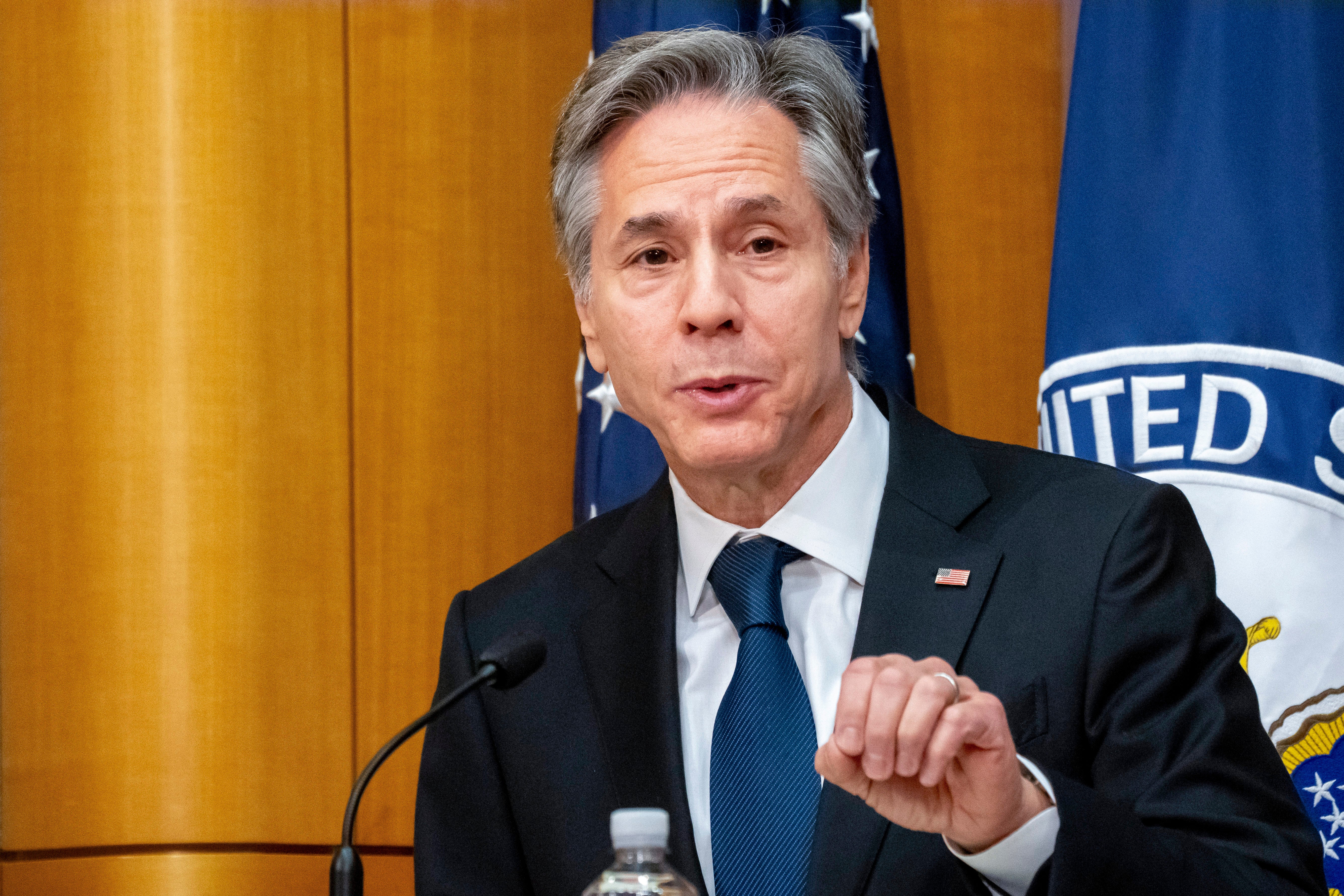Blinken has two urgent objectives in Israel – aid for Gaza and to stop the spread of this terrible war
Editorial: Too many civilians – including children – are being killed in Gaza, and too few Hamas commanders captured. That needs to be reversed

With at least 20,000 dead in Gaza, and much of the territory reduced to ruins while the rest is under siege and constant bombardment, it seems an odd moment to be talking about post-war reconstruction and a new political settlement for the strip and the wider region.
Yet recent experience of wars suggests that it is, in fact, never too soon to organise post-war planning, and to create a political framework for winning the peace, in the interests of all who inhabit the Middle East.
Certainly this will be on the agenda of the US secretary of state, Antony Blinken, as he embarks on his eighth visit to Israel and its neighbours since the horrific terrorism on 7 October provoked the current war.
Mr Blinken, something of a tireless veteran of shuttle diplomacy, is to visit leaders in Turkey, Greece, Jordan, Qatar, the United Arab Emirates, Saudi Arabia, Israel and Egypt, as well as meeting with representatives of the Palestinian Authority (PA) on the West Bank. His message, particularly to Benjamin Netanyahu and his colleagues, will be both familiar and unequivocal: work on the admittedly Sisyphean task of establishing peace must begin now, and in earnest.
According to the briefing given by the US Department of State before his departure, Mr Blinken will call principally on Israel, with the support of others in the region, to “chart a path forward for Gaza that achieves lasting security for both Israelis and Palestinians – as well as a more peaceful, integrated region ... and [includes] a sustained mechanism for reconstruction and Palestinian-led governance of a unified West Bank and Gaza”.
This an extremely welcome statement of intent, because not all of those who hold positions of power in the Israeli government seem to understand that it is not possible simply to wish away the existence of the Palestinian people, still less to encourage them to be involved in some sort of permanent exodus not only from their homes – a fate that has already befallen so many – but from their very homeland.
The vice-president of the United States of America should not have had to issue a statement that declared: “Under no circumstances will the United States permit the forced relocation of Palestinians from Gaza or the West Bank, the besiegement of Gaza, or the redrawing of the borders of Gaza” – but it is reassuring that Kamala Harris has done so. It is deeply dismaying that some of Mr Netanyahu’s junior ministers have rendered that necessary.
Scarcely more realistically, the Israeli defence minister, Yoav Gallant, has semi-officially promulgated an alternative plan whereby Gaza takes on the role of a self-governing colony of Israel – with the Israel Defense Forces and Mossad in control of its “security”. Obviously, this has been rejected out of hand by both Hamas and the PA, but the overriding objection to it is that, paradoxically, it is simply not possible for Israel to “control” security or much else in Gaza, as recent events demonstrate.
It is now almost three months since the October atrocities, but Israel has still not rescued all the hostages, still not decisively and permanently disabled Hamas (let alone Hezbollah), and the most senior Hamas commander its forces could find was assassinated far away in downtown Beirut. Such a successful “surgical” strike stands in stark contrast to the crude “killing rage” meted out in Gaza.
It is, then, exactly as Mr Blinken and all of Israel’s friends and allies, both in the West and in the region, have been warning: Israel has an inalienable right to self-defence, but its conduct of the war is making the state of Israel less (rather than more) secure. To put it at its mildest, Mr Netanyahu, Mr Gallant and their colleagues will need to think more carefully about what Israel can do to live in peace with its neighbours.
As urgent and crucial as that work is, Mr Blinken has two additional, and more urgent, immediate objectives.
The first is the need for humanitarian aid to be delivered to Gaza, for obvious reasons – among them being the high risk of outbreaks of deadly disease. The second is to prevent the further spread and escalation of the conflict. In this respect, the threats that have already emerged – including the possible closer involvement of Hezbollah in Lebanon and the West Bank, and the disruption to commercial shipping in the Red Sea by Houthi guerrillas based in Yemen – are serious enough. The world economy is in a fragile enough state without another supply shock.
The key to achieving these two objectives, just as with the longer-term challenges, is for Israel to wind down its current campaign in Gaza and move on to a different phase. Too many civilians – including children – are being killed in Gaza, and too few Hamas commanders captured. That needs to be reversed.






Join our commenting forum
Join thought-provoking conversations, follow other Independent readers and see their replies
Comments